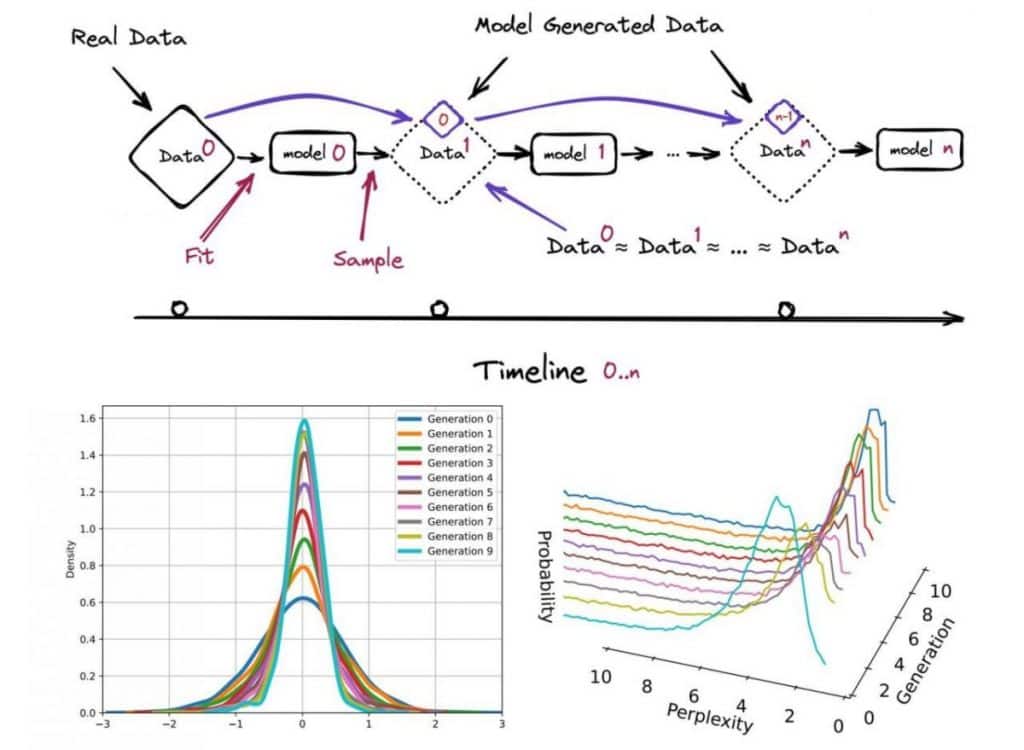[ad_1]
In just six months, generative AI has made significant strides, capturing the attention of the world. ChatGPT, a prominent example of this technology, quickly gained popularity and widespread use. However, renowned expert Ross Anderson warns about the potential risks associated with the intellectual decline of future generations of models.
Ross Anderson is a pioneer in safety engineering and a leading authority in finding vulnerabilities in security systems and algorithms. As a Fellow of the Royal Academy of Engineering and a Professor at the University of Cambridge, he has contributed extensively to the field of information security, shaping threat models across various sectors.

Now, Anderson raises the alarm about a global threat to humanity—the collapse of large language models (LLMs). Until recently, most of the text on the internet was generated by humans. LLMs have now become the primary tool for editing and creating new texts, replacing human-generated content.
This shift raises important questions: Where will this trend lead, and what will happen when LLMs dominate the internet? The implications go beyond text alone. For instance, if a musical model is trained with compositions by Mozart, subsequent generations may lack the brilliance of the original and produce inferior results, comparable to a musical “Salieri.” With each subsequent generation, the risk of declining quality and intelligence increases.
This concept may remind you of the movie “Multiplicity,” starring Michael Keaton, where cloning leads to a decline in intelligence and an increase in the stupidity of each subsequent clone.

The same phenomenon can occur with LLMs. Training a model with model-generated content leads to irreversible defects and the degradation of text quality over generations. The original distribution of content becomes distorted, resulting in an influx of nonsensical information. Gaussian distributions converge, and in extreme cases, text may become meaningless. Subsequent generations may even misperceive reality based on the mistakes made by their predecessors. This phenomenon is known as “model collapse.”
The consequences of model collapse are significant:


Fortunately, there is hope. Anderson suggests that model collapse can be prevented, offering a glimmer of optimism amid the concerns. To learn more about potential solutions and how to avoid the decline of online information quality, we encourage you to explore further.
While generative AI holds promise, it is essential to remain vigilant and address the challenges it presents. By understanding and mitigating the risks associated with model collapse, we can work towards harnessing the benefits of this technology while preserving the integrity of information on the internet.
Read more about AI:
[ad_2]
Read More: mpost.io









 Bitcoin
Bitcoin  Ethereum
Ethereum  Tether
Tether  XRP
XRP  Solana
Solana  USDC
USDC  TRON
TRON  Dogecoin
Dogecoin  Lido Staked Ether
Lido Staked Ether  Cardano
Cardano  Wrapped Bitcoin
Wrapped Bitcoin  Hyperliquid
Hyperliquid  Wrapped stETH
Wrapped stETH  Sui
Sui  Bitcoin Cash
Bitcoin Cash  Chainlink
Chainlink  LEO Token
LEO Token  Stellar
Stellar  Avalanche
Avalanche  Toncoin
Toncoin  USDS
USDS  WhiteBIT Coin
WhiteBIT Coin  Shiba Inu
Shiba Inu  Wrapped eETH
Wrapped eETH  WETH
WETH  Litecoin
Litecoin  Binance Bridged USDT (BNB Smart Chain)
Binance Bridged USDT (BNB Smart Chain)  Hedera
Hedera  Monero
Monero  Ethena USDe
Ethena USDe  Polkadot
Polkadot  Bitget Token
Bitget Token  Coinbase Wrapped BTC
Coinbase Wrapped BTC  Uniswap
Uniswap  Pepe
Pepe  Pi Network
Pi Network  Aave
Aave  Dai
Dai  Ethena Staked USDe
Ethena Staked USDe  Bittensor
Bittensor  OKB
OKB  BlackRock USD Institutional Digital Liquidity Fund
BlackRock USD Institutional Digital Liquidity Fund  Aptos
Aptos  Internet Computer
Internet Computer  Cronos
Cronos  Jito Staked SOL
Jito Staked SOL  NEAR Protocol
NEAR Protocol  sUSDS
sUSDS  Ethereum Classic
Ethereum Classic